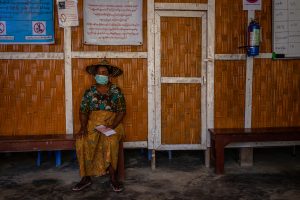I have spent nearly 30 years exposed to emergencies and humanitarian crises. Yet, standing at our “Hospital on the Hill” in Cox’s Bazar, Bangladesh, now the world’s largest refugee camp, I was taken by the sheer scale of this makeshift setting. A jumble of humanity packed together in precarious bamboo and plastic shelters, all contained within kilometers of razor wire fencing.
As we mark five years since the brutal campaign of violence meted out at the hands of the Myanmar military, I remember a Rohingya mother of six who said, “The military were brutally killing Rohingya and burning our houses… now, we live here in the refugee camps. It is five years of living in distress…”
The plight of the Rohingya – persecuted in Myanmar, living in containment in Bangladesh, trafficked and living illegally in Malaysia and elsewhere – is fast becoming a pressure cooker that no one seems inclined to take off the stove.
The approach to assistance in Bangladesh, the only country to open its borders and offer sanctuary to now over 1 million Rohingya, is increasingly unsustainable, with funding harder to secure. Five years on, the humanitarian response must transition from a minimum provision of emergency services to one better suited to a long-term resettlement reality.
For Bangladesh, this policy shift remains unacceptable. With good reason, Dhaka wants the Rohingya to return to Myanmar, which stripped them of their citizenship 40 years ago. This is also what nearly every Rohingya I have spoken with wants. But the country has been at war with itself since the military seized power in February 2021, and in Rakhine, tensions between the Myanmar military and Arakan Army are increasing. Our teams on the ground know firsthand the conditions for those that remain in Rakhine are unacceptable, and safe repatriation to this region is simply not a responsible option yet.
Additionally, across the region, Rohingya are treated as illegals and exploited by those who seek to benefit from their precarious status. In Malaysia and Indonesia, those who arrive by boats are turned away at sea, with some left adrift for months and others dying due to heat and starvation. In April this year, more than 500 Rohingya escaped from a detention center in Malaysia allegedly due to poor living conditions and lack of access to medical services.
Bangladesh feels the weight of responsibility is unfairly on them alone. I agree with Bangladesh. Regional states are becoming part of the problem, favoring securitization of their own borders over persevering to find solutions together. It feels like ASEAN has run out of steam, with nothing new to try and no one willing to champion what has become a fraught political problem.
The latest scabies outbreak in the camps and the increasing number of dengue fever cases are symptomatic of the emergency health needs of the population, while year-on-year increases in mental health and non-communicable disease consultations at Doctors Without Borders / Médecins Sans Frontières (MSF) facilities are indicative of the protracted nature of the crisis. In Cox’s Bazar, our mental health professionals told me how emotionally draining it is to know that they cannot change the root cause of people’s mental health conditions. At the end of a psychosocial session, our patients return to an existence devoid of prospects, in overcrowded camps that are becoming increasingly unsafe.
It is easy to argue this response has been a success. It has reduced loss of life, alleviated the worst suffering, and created order out of chaos. But we must ask ourselves: Are we becoming complicit in a system of containment (or repression) for a population with nowhere else to go?
The reality is we are substituting for the failures of Myanmar to redress its wrongs. We are also trying to cope with the cost of political inaction, an impotent failure of collective progress from regional states and the international community to find durable or even temporary solutions but better ones.
In all of this, the Rohingya remain extremely grateful to Bangladesh for giving haven, as hopeless as their situation appears to be. They don’t consider themselves to be stateless, but rather, denied the right to citizenship in a state and region they historically identify as their own. The majority say they want to return, but they will not risk a repeat of history where their children may be taken at any moment, never to be seen again.
Looking out from Doctors Without Borders’ Hospital on the Hill, I realize we must all push back against the overwhelming sense this cannot be fixed. There are things that can be done. A good start would be ending draconian refugee policies practiced across the region.
Australia’s new government could set the tone for humanity and solidarity, starting with the Rohingya. They can seek to open resettlement pathways for Rohingya from Malaysia and Bangladesh. Australia could recalibrate its anti-human trafficking support across the region to be more accommodating of people who qualify as refugees and deserve extra protections.
Malaysia, Thailand, and Indonesia must be more accommodating of refugees. They cannot be treated as irregular economic migrants. While both are extraordinarily vulnerable, refugees seek refuge from persecution and require special protection.
Diplomatic channels with Myanmar must remain open, and a stronger, coherent regional and international approach with Myanmar must be hammered out, with China at the forefront. China can lead in negotiating the safe return of Rohingya from Bangladesh, but it must consider how Rohingya will be compensated for lost property and livelihoods within those negotiations. Returns must be more than a political façade and must solve the issues of the Rohingya themselves.
Failing meaningful and safe return to Myanmar, I worry what the future holds. How long can people live with so little basic protection and hope? Trauma is cumulative. After 40 years of statelessness and injustice, I worry the care we provide only manages to keep people alive to live in hopelessness.

































